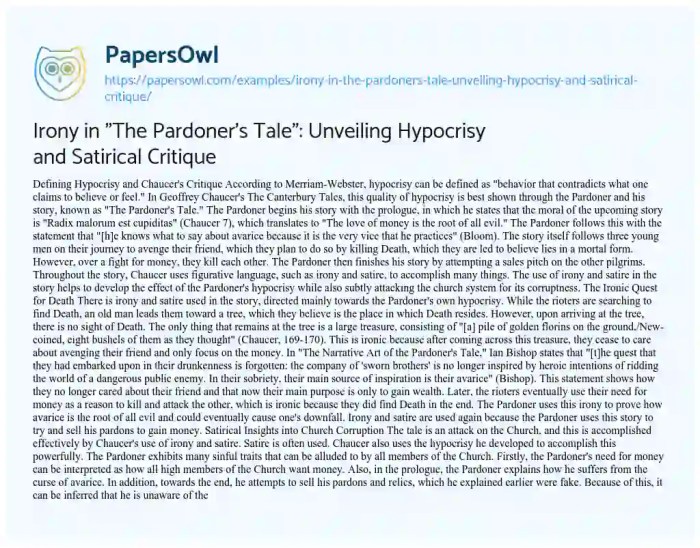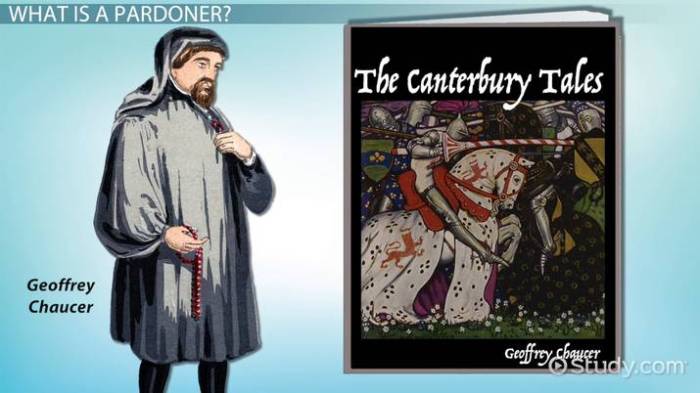Examples of irony in the pardoner’s tale – This comprehensive analysis delves into the intriguing examples of irony employed in Geoffrey Chaucer’s “The Pardoner’s Tale.” Through a meticulous examination of situational, verbal, dramatic, Socratic, and historical irony, we uncover the intricate tapestry of irony that enriches this literary masterpiece.
From the glaring contradictions between the Pardoner’s outward piety and his inner corruption to the subtle interplay of words and meanings, this essay sheds light on Chaucer’s masterful use of irony to critique human nature, expose hypocrisy, and explore the complexities of medieval society.
Situational Irony
Situational irony occurs when the outcome of a situation is the opposite of what was expected or intended.
In The Pardoner’s Tale, the Pardoner himself is a prime example of situational irony. He is a religious figure who preaches against greed and materialism, yet he is also a greedy and materialistic person. He sells fake relics to his congregation and pockets the money for himself.
, Examples of irony in the pardoner’s tale
- The Pardoner’s greed and materialism contrast sharply with his religious vocation.
- The Pardoner’s hypocritical behavior undermines his own message.
- The Pardoner’s ultimate fate (being killed by his own greed) is a fitting example of situational irony.
Verbal Irony: Examples Of Irony In The Pardoner’s Tale

Verbal irony occurs when someone says one thing but means the opposite. It can be used for humor, sarcasm, or to make a point.
The Pardoner uses verbal irony throughout his tale. For example, he says that he is “a very holy man” and that he “never lies.” However, his actions and words throughout the tale show that he is neither holy nor truthful.
, Examples of irony in the pardoner’s tale
- The Pardoner’s self-proclaimed holiness is contradicted by his greedy and materialistic behavior.
- The Pardoner’s claim to never lie is ironic given his many lies and deceptions.
- The Pardoner’s use of verbal irony creates a sense of humor and sarcasm.
Dramatic Irony

Dramatic irony occurs when the audience knows something that the characters in the story do not. This can create suspense, tension, or humor.
Chaucer uses dramatic irony in The Pardoner’s Tale to create suspense and tension. For example, the audience knows that the three young men are going to be killed by the old man, but the young men themselves do not know this.
, Examples of irony in the pardoner’s tale
- The audience’s knowledge of the old man’s plan creates suspense and tension.
- The young men’s ignorance of their own fate makes their actions seem even more reckless and foolish.
- Chaucer’s use of dramatic irony adds to the overall impact of the tale.
Socratic Irony

Socratic irony is a form of irony in which someone pretends to be ignorant or less knowledgeable than they actually are in order to draw out the truth from others.
The Pardoner uses Socratic irony in his tale to expose his own hypocrisy. For example, he asks the audience, “What is greed?” and then goes on to describe his own greedy and materialistic behavior.
, Examples of irony in the pardoner’s tale
- The Pardoner’s use of Socratic irony allows him to expose his own hypocrisy.
- The Pardoner’s Socratic questioning forces the audience to confront their own greed and materialism.
- The Pardoner’s use of Socratic irony adds to the overall complexity and depth of his character.
Historical Irony

Historical irony occurs when an event or situation has a different meaning or significance in retrospect than it did at the time it occurred.
The Pardoner’s Tale is full of historical irony. For example, the tale was written during the Black Death, a time of great social and economic upheaval. The tale’s themes of greed, materialism, and death would have resonated deeply with Chaucer’s audience.
, Examples of irony in the pardoner’s tale
- The Pardoner’s Tale reflects the social and economic conditions of the Black Death.
- The tale’s themes of greed, materialism, and death would have been particularly relevant to Chaucer’s audience.
- The Pardoner’s Tale can be seen as a historical document that provides insight into the social and religious beliefs of the time.
FAQ Section
What is the significance of situational irony in “The Pardoner’s Tale”?
Situational irony plays a pivotal role in highlighting the Pardoner’s hypocrisy. His role as a religious figure tasked with selling pardons for sins stands in stark contrast to his own corrupt and sinful behavior.
How does Chaucer employ verbal irony in the tale?
Chaucer uses verbal irony to create a sense of tension and unease. The Pardoner’s eloquent speeches on the dangers of greed and the importance of repentance are ironically juxtaposed with his own materialistic desires and lack of genuine remorse.
What is the purpose of dramatic irony in the tale?
Dramatic irony allows the readers to know more than the characters, creating a sense of suspense and anticipation. Chaucer uses this technique to foreshadow the Pardoner’s eventual downfall and to highlight the gullibility of those who fall prey to his false promises.